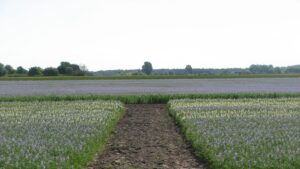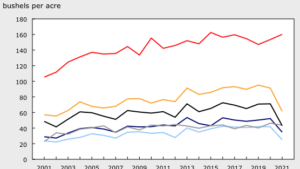https://www.youtube.com/watch?v=9foi342LXQE
Open a newspaper these days in Europe and you’ll find a slew of articles about the United Kingdom’s European Union membership referendum, also known as the EU referendum or “Brexit”, that is scheduled to take place on June 23.
On that day, the British people will vote whether to leave the EU or not. Proponents and opponents of the Brexit are rolling over each other and throwing around strong statements on the perceived benefits and disasters of leaving the EU. Very frequently, I can’t help but remember the hilarious Monty Python sketch ‘What have the Romans ever done for us?’
In order to understand better the possible consequences of a Brexit, it is important to understand more about the EU’s Common Agricultural Policy (CAP). This policy is a cornerstone of the EU, taking a 40 per cent slice out of its €58 billion annual budget. This CAP was set up in 1957 and currently provides financial support to some 12 million farmers across Europe, boosting agricultural productivity, with the final aim to ensure the EU’s food supplies.
The CAP structure has evolved over time. The original scheme effectively boosted market prices, leading to over-production. Who doesn’t remember the (in)famous butter mountains and milk and wine lakes of the 1980s? In response, the EU introduced quotas on everything from milk to sugar beets, which are only now starting to be lifted, and by changing the system to make direct payments to farmers. These direct payments were changed again in the mid-2000s to reward farmers for particular land use, and in 2013 new green incentives were introduced for adopting measures such as tending to wild grassland.
The CAP scheme has two main pillars: direct payments, known as the Basic Payment Scheme (BPS), and funding for the wider rural economy. In 2015, UK farmers received almost €3.1 billion in direct payments, according to the National Farmers Union (NFU). The UK farmers have access to the €5.2 billion pot of funding that has been allocated for rural development projects over the period 2014-2020, including €2.3 billion that has been transferred from the BPS to the UK rural development programmes. In total, 55 per cent of UK total income from farming comes from CAP support.
Very frequently, I can’t help but remember the hilarious Monty Python sketch ‘What have the Romans ever done for us?’
So to estimate what would happen if Britain leaves the EU all depends on what – if anything – would replace CAP. It seems like ‘Mission Impossible’ to try and measure the impact of the UK being outside the EU, since it is not known what kind of relationship the UK would have with the EU nor the conditions under which UK farmers would be expected to operate.
CAP subsidies form a significant part of most farm incomes, and the UK government would be unlikely to match the current levels of subsidy. So it seems fair to say the leaving the EU regime would probably reduce farm incomes for UK farmers. The National Farmers Union in the UK is very critical about Britain leaving the EU, arguing that by removing the CAP support, while it remains in place in the rest of Europe, could devastate British farming.
Consultancy firms have calculated that land prices would crash and 90 per cent of farmers could go out of business. On the other hand, some advocates of the Brexit, like UK farming Minister George Eustice, insist that Britain could opt to continue providing subsidies. But many are certain that no UK government would subsidise agriculture on the scale seen under the CAP.
Apart from agriculture, there would also be an impact on the UK’s environment. EU regulations have done their fair share to improve the environment in the UK. Britain’s seas are far cleaner now than they were in the last few decades thanks to the EU’s push to tackle water and air pollution. Currently only 4.9 per cent per cent of UK bathing sites had “poor” water quality. And similar directives have addressed poor air quality, endangered species and strict guidelines on potentially dangerous chemicals which all have proven to be successful. The EU’s aim for 20 per cent of energy to come from renewables by 2020 has also been credited for the rapid growth in the UK’s renewable energy industry.
The UK has a history of resisting and watering down EU environmental guidelines and environmentalists argue that a Brexit would almost certainly be bad for the UK and global environment.
So the question remains, apart from a stronger farming sector, higher water and air quality, better protection of endangered species, stricter guidelines on the use of potentially dangerous chemicals, a boost to UK industry and increased food security, what did the EU ever do for the UK?
Taking all this into consideration, it is hard to see that an exit would be beneficial to the UK farming sector, or to the UK food and drink industry more generally. Let’s hope common senses prevails.













